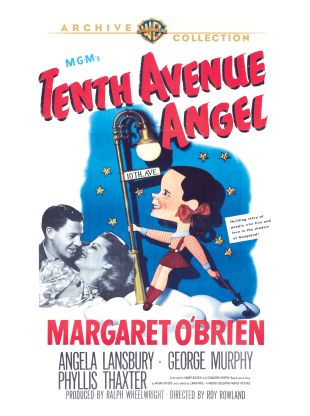"Felix, every time you talk sports, my ulcer acts up," Oscar Madison once said to Felix Unger in an episode of The Odd Couple -- that's sort of how one feels whenever MGM tried to show life among the working classes, especially in urban settings; and Depression-era 10th Avenue in New York is about as urban as you could get -- not for nothing is the real neighborhood known as "Hell's Kitchen." There are some good actors in Tenth Avenue Angel, including Rhys Williams and Angela Lansbury, but most of them look too good (especially Lansbury's hair) and the streets, store-fronts, and buildings mostly look too clean; and when there's a block party for the neighborhood, the music in the background is Johann Strauss (with lots of strings) rather than something that might actually have been played. And then there's Margaret O'Brien's too-intense performance -- she's almost a hyper-active presence in the first half of the movie as the desperately upbeat Flavia, and too self-consciously "dramatic" in the second half, once she's learning to cope with disillusionment. O'Brien was, of course, the raison d'etre for the movie (which, one has an uneasy feeling, was conceived as MGM's "answer" to Fox's A Tree Grows In Brooklyn). And if director Roy Rowland had just had her dial it back a couple of notches, the movie would probably hold together slightly better, not that "slightly" would have been enough, in a script that manages to combine cows and miracles (don't ask) in a mid-twentieth century New York setting. Genial George Murphy is pleasant to watch in action, and Phyllis Thaxter tries hard as O'Brien's mother, but Angela Lansbury looks too good and speaks too well. And there are so many other problems with the picture -- such as how does a script in which the young heroine is wise enough to know that stage magic (i.e., prestidigitation) is just that, tricks and sleight-of-hand, explain how she also believes in magical occurrences such as mice turning into money -- that even a more restrained performance by O'Brien would only have patched some of the bigger holes. It's no accident that the movie was held back from release for almost two years -- it finished shooting in May of 1946, with retakes done in the spring of 1947, and a release in early 1948, so you know that not even MGM was anxious for anyone to see this picture. One curious matter of trivia about the casting is also worth noting -- 18 years later, George Roy Hill would direct another (and much better) New York-based film the plot of which was hooked around girls' fantasies, called The World Of Henry Orient, which would also co-star Angela Lansbury and Phyllis Thaxter; everyone was happier with the results in that movie.

Tenth Avenue Angel (1948)
Directed by Roy Rowland
Genres - Drama |
Release Date - Feb 20, 1948 (USA - Unknown), Feb 20, 1948 (USA) |
Run Time - 74 min. |
Countries - United States |
MPAA Rating - NR
Share on